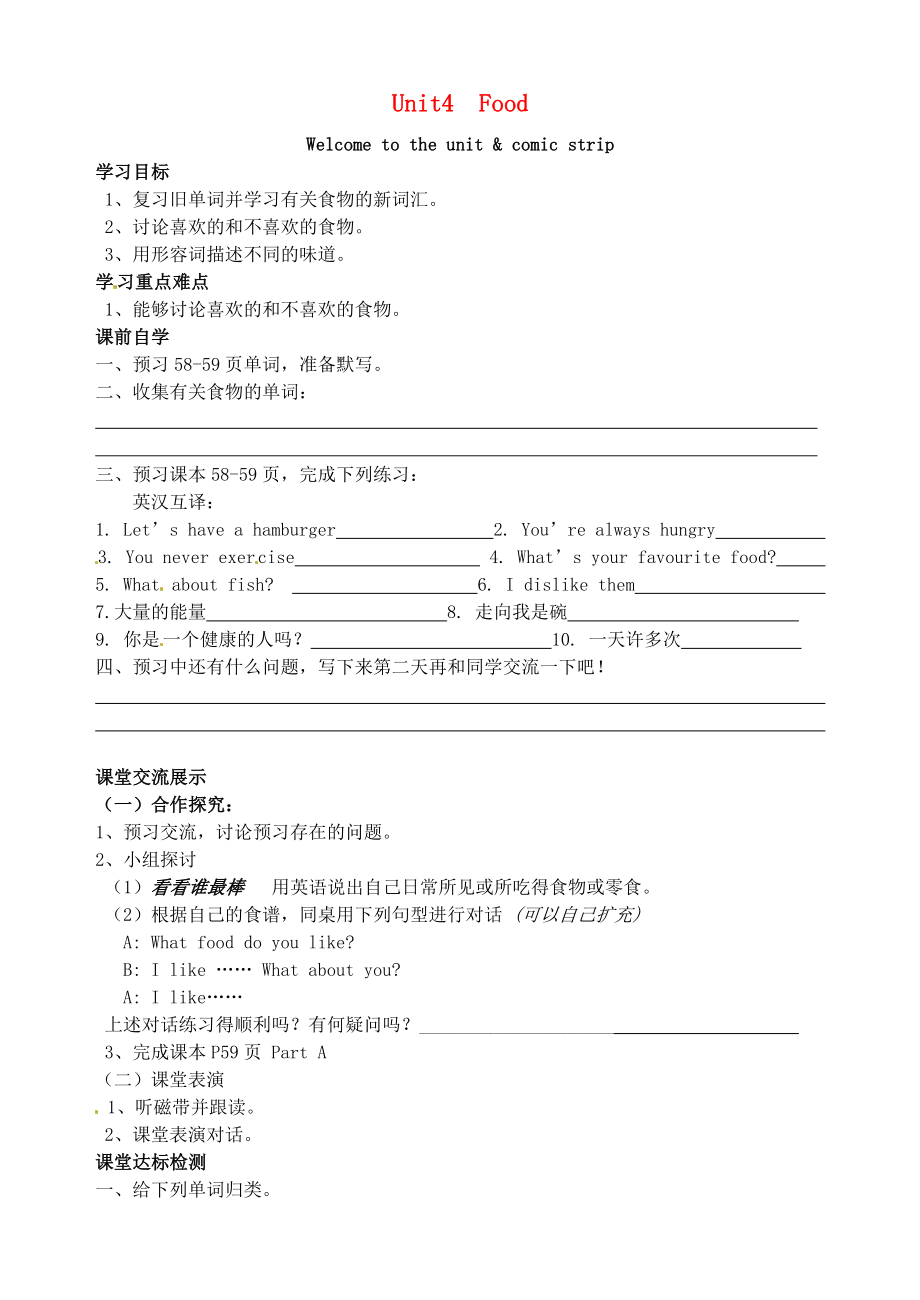《江蘇省鹽城市神州路初級(jí)中學(xué)七年級(jí)英語上冊(cè) Unit 4 Food Weilcom to the unit導(dǎo)學(xué)案(無答案) 牛津版》由會(huì)員分享�,可在線閱讀����,更多相關(guān)《江蘇省鹽城市神州路初級(jí)中學(xué)七年級(jí)英語上冊(cè) Unit 4 Food Weilcom to the unit導(dǎo)學(xué)案(無答案) 牛津版(2頁珍藏版)》請(qǐng)?jiān)谘b配圖網(wǎng)上搜索。
1、Unit4 Food
Welcome to the unit & comic strip
學(xué)習(xí)目標(biāo)
1���、復(fù)習(xí)舊單詞并學(xué)習(xí)有關(guān)食物的新詞匯��。
2���、討論喜歡的和不喜歡的食物�。
3、用形容詞描述不同的味道��。
學(xué)習(xí)重點(diǎn)難點(diǎn)
1�����、能夠討論喜歡的和不喜歡的食物���。
課前自學(xué)
一�����、預(yù)習(xí)58-59頁單詞���,準(zhǔn)備默寫。
二��、收集有關(guān)食物的單詞:
2、
三���、預(yù)習(xí)課本58-59頁��,完成下列練習(xí):
英漢互譯:
1. Let’s have a hamburger 2. You’re always hungry
3. You never exercise 4. What’s your favourite food?
5. What about fish? 6. I dislike them
3��、
7.大量的能量 8. 走向我是碗
9. 你是一個(gè)健康的人嗎��? 10. 一天許多次
四���、預(yù)習(xí)中還有什么問題,寫下來第二天再和同學(xué)交流一下吧��!
4�����、
課堂交流展示
(一)合作探究:
1��、預(yù)習(xí)交流�,討論預(yù)習(xí)存在的問題。
2��、小組探討
(1)看看誰最棒 用英語說出自己日常所見或所吃得食物或零食。
(2)根據(jù)自己的食譜��,同桌用下列句型進(jìn)行對(duì)話 (可以自己擴(kuò)充)
A: What food do you like?
B: I like …… What about you?
A: I like……
上述對(duì)話練習(xí)得順利嗎�����?有何疑問嗎�?_____________________
3、完成課本
5��、P59頁 Part A
(二)課堂表演
1�����、聽磁帶并跟讀��。
2�����、課堂表演對(duì)話��。
課堂達(dá)標(biāo)檢測(cè)
一���、給下列單詞歸類。
rice, fish, hamburgers, oranges, chicken, cakes, coke, tea, lemon, chocolate, vinegar, dried fish, sugar, sandwich, bananas, eggs, tomatoes, salad, milk.
??Fruit:
??Vegetables:
??Fast food:
??Drinks:
??Other food:
二、用所給詞的適當(dāng)形式
6�、填空
1. I walk to the playground many (time) a day.
2. he likes fish, but he (dislike) meat.
3. We want to eat some (chicken)
4. Please give me three (bowl) of rice.
5. The old man (exercise) every day, so he is very (health)
三、同意句
1. I lik
7��、e cakes. Do you like cakes? I like cakes. You?
2. Jill and I don’t like oranges. Jill and I oranges.
3. What fruit do you like best? What’s fruit?
能力提高(可選做)
Halloween falls on October 31st. It is one of the most favourite
8��、 holidays for children in the USA. People dress up in costumes like a witch, a ghost or a skeleton (骷髏). The children go to houses to say "Trick or treat!" Long ago, if a child was not good, he or she would get a trick like having a stone in his or her bag instead of some candy. Nowadays(如今), no one
9�����、 gets tricks. All the children receive lots of candy. Parties are also popular in the evening. People go to parties in costumes and play different games. People also like listening to ghost stories and watching scary movies.
根據(jù)短文內(nèi)容完成下列句子�����。
1. Halloween usually happens on_______.
2. It is one of the most favourite holidays for children in the_______.
3. The children go to houses to say_______ to get some candy.
4. Nowadays, all the children _______ lots of candy.
5. The best title of this passage is _______.
課后作業(yè):《與課堂同行》P66-67
 江蘇省鹽城市神州路初級(jí)中學(xué)七年級(jí)英語上冊(cè) Unit 4 Food Weilcom to the unit導(dǎo)學(xué)案(無答案) 牛津版
江蘇省鹽城市神州路初級(jí)中學(xué)七年級(jí)英語上冊(cè) Unit 4 Food Weilcom to the unit導(dǎo)學(xué)案(無答案) 牛津版

